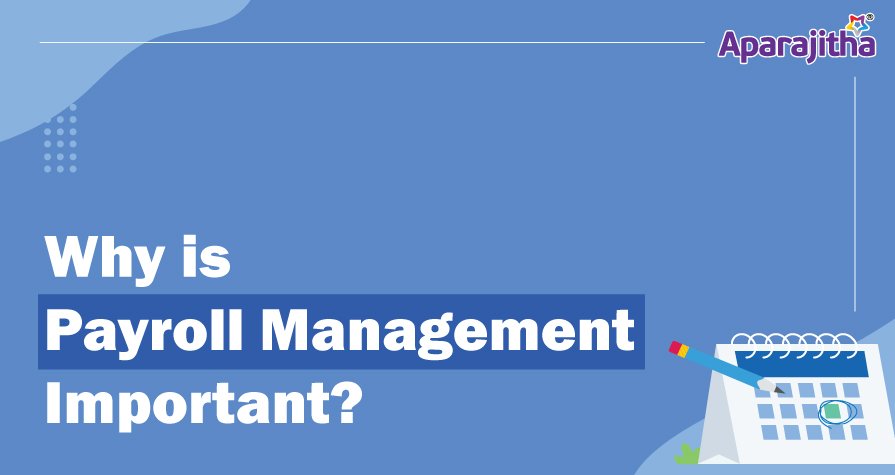Payroll management is managing and organising the payment of employees’ salaries, wages, bonuses, and deductions. It is essential to run an organisation and plays a crucial role in maintaining employee morale, ensuring legal compliance, and promoting financial stability. In this blog post, we will explore the importance of the payroll management process and its benefits to business of all sizes.
1.Accurate Payment of Employees
Payroll management is important because it ensures accurate payment of employees. When payroll management is effective, employees receive the accurate pay on time, and it can go a long way in promoting employee satisfaction and loyalty. Payroll management involves:
- Keeping accurate records of employee timings
- Calculating employee gross pay
- Deducting taxes and other withholdings
- Issuing salaries or direct deposits
Benefits of Accurate Payment of employees
- Ensuring employee satisfaction: Accurate payment of employees ensures that they receive the correct pay on time, which helps promote employee satisfaction and loyalty.
- Complying with legal requirements: A payroll management process must comply with various legal requirements, such as tax laws, labor laws, and other regulations. Accurate payment of employees ensures that businesses comply with these regulations and avoid legal issues.
- Improving financial management: Accurate payroll management process provides businesses with detailed financial records, which can help them make informed financial decisions, plan budgets, and forecast future expenses.
- Maintaining employee records: Payroll management involves accurate records of employee hours, salaries, bonuses, and deductions. This information is critical to maintaining employee records for performance evaluations, promotions, and other human resource functions.
- Enhancing productivity: By outsourcing payroll management or using payroll management software, businesses can free up valuable time and resources that can be used for other business functions, enhancing overall productivity.
2. Legal Compliance
Another reason why the payroll management process is necessary is that it ensures legal compliance. It is essential for businesses to comply with regulations when it comes to paying their employees. These regulations include minimum wage requirements, overtime pay, payroll taxes, and benefits. Failure to comply with these regulations can result in costly fines, lawsuits, and damage to the company’s reputation. By properly managing payroll, businesses can ensure they are in compliance with these regulations and avoid legal issues.
Benefits of Legal Compliance
- Avoiding legal issues: Compliance with legal requirements helps businesses avoid penalties, steep fines, and legal issues related to non-compliance. This can save businesses significant money and time spent on legal battles.
- Protecting employee rights: Compliance with legal requirements helps protect employee rights, ensuring that they are paid fairly and receive the benefits to which they are entitled. This way, we can ensure employee satisfaction and loyalty.
- Enhancing reputation: Compliance with legal requirements can enhance a business’s reputation as a responsible and ethical employer. This can attract new customers, investors, and employees who value ethical business practices.
- Improving financial management: Compliance with legal requirements can help businesses avoid unexpected expenses associated with penalties and fines, enabling them to allocate resources more effectively and plan for future expenses.
- Ensuring accurate financial reporting: Compliance with legal requirements helps ensure accurate financial reporting to make informed business decisions, plan budgets, and forecast future expenses.
3.Efficient and Streamlined Processes
Payroll management can also help businesses streamline and automate their payroll processes, reducing the time and effort required to manage payroll manually. With the help of payroll management software, businesses can easily input employee data, calculate pay, and generate reports, reducing the risk of errors and saving time. By streamlining these processes, businesses can focus on other important aspects of their operations, such as sales and customer service, improving overall efficiency.
Benefits of Efficient and Streamlined Processes
- Improved accuracy: Streamlined processes help minimize errors and ensure accurate payroll processing, reducing the risk of overpayments, underpayments, and other errors that can lead to employee dissatisfaction and legal issues.
- Reduced costs: Efficient and streamlined processes help reduce the costs associated with payroll management, such as labor costs, processing fees, and software expenses. This method can help businesses save money and allocate resources more effectively.
- Increased productivity: Efficient processes help businesses process payroll quickly and accurately, freeing up valuable time and resources for other business functions and increasing overall productivity.
- Better compliance: Streamlined processes can help businesses comply with legal requirements and regulations associated with payroll management. This way, we can avoid legal issues and penalties related to non-compliance.
- Enhanced employee satisfaction: Efficient and streamlined processes ensure employees are paid on time, enhancing employee satisfaction and loyalty.
4.Budgeting and Financial Planning
An effective payroll management process can also help businesses with budgeting and financial planning. By accurately tracking employee wages and benefits, businesses can better understand their financial obligations and plan for future expenses. This can help businesses avoid cash flow issues and ensure they have enough funds to pay their employees on time. In addition, payroll reports can provide valuable insights into business performance, allowing businesses to make informed decisions and improve their financial position.
Benefits of Budgeting and Financial Planning
- Ensuring Adequate Cash Flow: Organisations can ensure adequate cash flow by budgeting and forecasting payroll expenses to meet their payroll obligations. This can help prevent any delays or missed payments to employees.
- Minimizing Financial Risk: Budgeting and financial planning can help organisations minimize financial risk by identifying potential problems and taking steps to mitigate them. For example, forecasting payroll expenses can help organisations identify when to cut costs or adjust salaries to remain financially stable.
- Compliance with Regulations: Budgeting and financial planning can help organisations comply with tax laws and regulations. By forecasting payroll expenses, organisations can ensure that they are setting aside enough money for payroll taxes and other regulatory requirements.
- Improved Decision Making: Budgeting and financial planning help organisations with payroll expenses. Organisations can identify trends, make informed decisions, and take proactive steps to improve their financial health by analyzing financial data.
- Better Communication: Budgeting and financial planning can improve communication between payroll departments and other parts of the organisation. By providing financial data to other departments, payroll managers can help them better understand the costs associated with employee compensation and make more informed decisions.
- Increased Efficiency: Budgeting and financial planning can help organisations streamline payroll processes and reduce administrative costs. Organisations can free up time and resources to focus on other important tasks by automating specific tasks, such as payroll calculations and tax withholdings.
5.Employee Motivation and Retention
A payroll management process is also critical in motivating and retaining employees. When an organisation pays the employees accurately and on time, they are more likely to feel valued and motivated to perform their jobs to the best of their ability. In addition, offering competitive salaries, bonuses, and benefits can help businesses attract and retain top talent, reducing turnover and associated costs. Businesses can provide fair and competitive compensation by managing payroll effectively and improving employee satisfaction and retention.
Benefits of Employee Motivation and Retention
- Increased employee productivity: When motivated, employees tend to be more productive, ultimately resulting in increased profitability for the organisation.
- Cost savings: High employee turnover can be costly for organisations, as they have to spend time and resources recruiting and training new employees. By focusing on employee retention, organisations can save on these costs.
- Improved employee morale: When employees feel valued and appreciated, it can lead to improved morale and job satisfaction, which can, in turn, lead to increased productivity and retention.
- Enhanced employer brand: Organisations with a reputation for treating their employees well can attract top talent and build a strong employer brand, which can be a competitive advantage in the job market.
- Better customer service: Motivated and engaged employees are likelier to provide excellent customer service, increasing customer satisfaction and revenue.
Payroll Management’s Role in Running a Business
In conclusion, payroll management is essential to running a business, regardless of size or industry. It plays a crucial role in ensuring accurate and timely payment of employees, legal compliance, efficient and streamlined processes, budgeting and financial planning, employee motivation and retention, and protecting sensitive information. By effectively managing payroll, businesses can improve their operations, reduce costs, and promote a positive work environment for their employees.







